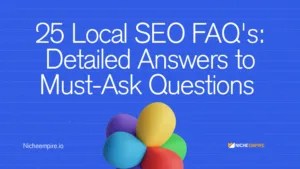Hyper Local SEO for Local Businesses
Hyperlocal SEO is a targeted form of local SEO that can help you reach out to prospects within a few-mile radius of your business.
Today, we’ll explain everything you need to know about Hyperlocal SEO. What is it? How does it differ from local SEO, and what are the best strategies to dominate local search results within your neighborhood or town?
Without further ado, let’s dive in.
What is Hyperlocal SEO?
Hyperlocal SEO is a process of optimizing your site for super-specific location details like neighborhoods, towns, suburbs, landmarks, and even street names. It goes beyond local SEO, where you target keywords based on states, cities, or regions.
Hyperlocal SEO narrows your audience to users within walking distance of your business. This allows you to climb the search rankings when users within your business area enter location-specific keywords like “restaurants in Cutler Bay Miami-Dade County.”
Hyperlocal searches are mostly done on mobile devices, where users actively look for local businesses in their immediate vicinity.
People can use hyperlocal terms when they are in a hurry or making a last-ditch attempt to find a local business, such as a hair salon, auto mechanic shop, or HVAC company.
Importance of Hyperlocal Optimization
The benefits of hyperlocal SEO are numerous, especially for brick-and-mortar businesses. Here are a few reasons why hyperlocal is crucial for local companies:
Compete with Big Local Businesses
With Hyperlocal SEO makes it’s easier to compete with big local businesses within your physical location. Using location-specific terms based on your town, landmarks, or surroundings, you can dominate your area in the hyperlocal search results.
High Buying Intent
Hyperlocal keywords usually have a transactional intent because users are looking for local businesses that can help them immediately. This will, in turn, result in higher conversions, though with lesser search volume. It will also lead to more sales because you’re catering to specific local needs with less competition.
Appear in Google Local-three Pack and Maps
Hyper-local SEO will help you earn a coveted spot on Google’s local three-pack listing and Google Maps for laser-focused keywords that describe your business location, attract local customers to your front door, and increase your local search visibility.
Good Return on Investment
It will give you a good ROI because it’s easier to rank for highly specific local terms and costs way less than local SEO that targets broader markets. Plus, you are acquiring ready-to-buy local leads, which makes it easier to grow your business. In this post we shared strategies to increase leads from local SEO.
Improves your Local Visibility
Hyperlocal SEO helps your business to be known by potential customers in your vicinity. This increases your local authority and brand awareness. Your business will be seen as a top brand in your area, bringing in more business.
What’s the Difference between Hyperlocal SEO and Local SEO?
Hyperlocal SEO is a more advanced form of local SEO that targets niche-specific local terms like neighborhoods, landmarks, and streets. Local SEO has a broader focus and targets states, cities, and regions.
As a local business, you must take the time to implement hyperlocal and local SEO strategies and allocate more resources for hyperlocal SEO because you want to be found on search engines like Google for keywords related to your products or services within your neighborhood.
Let’s assume you’re a homeowner in Duck Creek in Garland looking for an emergency HVAC company to fix your furnace. Would you prefer to type “emergency furnace repair in Dallas” or “emergency furnace repair in Duck Creek, Garland”? You’d surely choose the second option.
These hyperlocal long-tail keywords up your SEO game because they have remarkable conversions even with lesser traffic. It is more cost-effective than competing for terms like “furnace repair near me,” which could pull up a string of huge competitors farther from the searcher’s location.
How to Optimize Local Search Results with Hyperlocal SEO
Now that you’ve learned the basics of hyperlocal SEO, let’s examine the practical digital marketing strategies for ranking on search engine results for hyperlocal keywords.
Build a List of Hyperlocal Terms
First, you need to map out the neighborhoods, landmarks, and surrounding areas near your business. You can use Google Maps to get a list of communities, intersections, streets, landmarks, and suburbs near your business.
Next, ask your customers and neighbors about the nicknames of surrounding landmarks and neighborhoods close to your business. Continue doing this until you have a decent list of hyperlocal terms to attach to the keywords that relate to your products or services.
Carry out Keyword Research
When targeting keywords, you should consider three main factors: search volume, relevance to your business, and search intent.
To find hyperlocal keywords, follow these steps:
- Copy your hyperlocal terms list and paste it into a spreadsheet or document.
- Use the Niche Empire keyword research tool to check the keywords you currently rank for. Then, filter the top-of-the-funnel keywords based on search volume and keyword difficulty. Next, export this data to your spreadsheet.
- Enter your top 2-3 local competitors in your location and do the same. Export the competitor keywords to a spreadsheet
- Clean up your list by going through your spreadsheet and deleting keywords that are not relevant to your locality and business
- Use the hyperlocal terms in your spreadsheet to get location-specific variations of your keywords. For example, enter a keyword in your keyword research tool and input a landmark or neighborhood in the “include” filter to get related terms
- Rinse and repeat for your current keyword rankings and competitor rankings, and you’d have a giant list of hyperlocal terms to target
- Get additional search queries by entering hyperlocal terms on Google and copy the terms it suggests in the auto-complete section. You can use the “People also ask” and “Related search” sections to find more keywords.
If you lack the resources to match the content and backlinks of the pages in the organic search results, you should choose another keyword.
To get quick wins, go for keywords with low search volume and keyword difficulty (say 30 and below) and check the search results to understand the user intent and what type of page or content to create.
In this example, we focused on keywords with buying intent, but you should also target informational keywords to supplement your local presence.
Optimize your Google Business Profile for Hyperlocal Keywords
A Google Business Profile(GBP) formally Google My Business is necessary for any business operating within a particular location. It will help you appear in the local three-pack and Google Maps and drive local traffic to your site for free.
Follow the steps below to optimize your Google Business Profile:
- Completely fill out your profile with details like your service location(s), working hours, products/services, and contact information
- Creatively work in your hyperlocal search terms into your business description and products or services section.
- Add high-quality images of your business and the surrounding areas. You can also use videos to make your brand more presentable
- Contact your past customers and ask them to leave a review on your GBP. Create a review email automation that goes out after you complete customer service. Respond to all your reviews, both positive and negative.
- Ensure that your NAPW (name, address, phone number, and website) is consistent across all platforms, such as your website, GBP, online directories, and social media pages.
- Examine the Google Business Profiles of your competitors ranking in the local three-pack and model them
- Post content in your GBP regularly to inform your customers about special offers and deals
Additionally, check if your business information is accurately represented on Google Maps and make changes where necessary.
Learn more about local SEO for small businesses.
Provide Directions to your Business
To ensure that your business shows up on the search results and Google Maps for geographical area terms, include driving directions, parking lots, and location details. This will assist your prospects in finding your office or store.
Plus, it will help Google crawlers better understand your business’s location and rank your site accordingly. You can add these location details to your Google Business Profile, Google Maps, and website to get a strong foothold of your business location online.
Enlist in Local Directories
Local directories display basic business information, such as your business name, services or products, location(s), description, reviews, and star ratings. Some prospects use directories to compare local businesses and their offerings before purchasing.
In addition, you’ll get a citation or link back to your website, which can increase your search engine rankings. You can sign up for big directories like Yelp, Angi List, Yellow Pages, and local online listings that contain the exact location of your business.
Create High-quality Content
After you’re done with your keyword research, decide on which type of content you want to create to fulfill the search intent. You can create articles, guides, YouTube videos, and location landing pages highlighting topics about your locality or neighborhood.
It could be how-to tips, seasonal content, or whatever information your local audience will genuinely care about. As you publish local content, check your local traffic using a tool like Google Analytics and Google Search Console to know the content that’s doing well and the ones to optimize.
Also, accompany your content with branded images and input your location in the image alt text and inside the image to optimize the image for your target location (s). Distribute your content across multiple channels, like your website and social media pages, to ensure that you employ the best practices in content marketing.
If you’re operating in different locations, create SEO landing pages targeting local keywords related to the branch. Then, link those pages to your Google Business Profile to show Google that you operate in multiple locations.
Use Schema Markup
Schema markup or structured data enables your business to stand out in SERPs with rich snippets like star ratings, working hours, price, products/services, number of reviews, site links, image thumbnails, etc.
Adding this feature to your site pages will help you increase your business credibility and CTR(click-through rate) on Google search results. Users can quickly overview the types of products you offer and learn more about your local business based on the organic results.
Acquire Backlinks from Local Businesses
Backlinks are one of Google’s key ranking factors and tell the search algorithm that your site or page is a reputable source and authority in your location. You can get localized links to your pages by proactively contacting local businesses within your niche with guest post offers and partnerships.
On the other hand, you can create super valuable content like guides, case studies, and research reports about your neighborhood, landmarks, and surroundings, and local businesses will be happy to cite your content on their site.
In addition, interview popular local journalists and business owners about industry topics related to your town or local events.
Then, use the interview extract to create a thought-leadership article that your interviewee will be glad to link to. This article can also attract editorial or do-follow links to your site.
You can also claim unlinked mentions on local websites and replace broken links on local sites with your web page. The general link-building strategies apply to hyperlocal SEO, except that you’re targeting businesses within your location.
Track your Hyperlocal Search Traffic
Search engine optimization(SEO) is an ongoing process, so you must constantly check the hyperlocal keywords you are ranking for to find content gaps and link-building opportunities.
You can do this by entering your website URL in an SEO tool like Niche Empire and filtering your top-ranking pages down to your local-based content to discover how to improve your local search engine visibility.
Moreover, run regular site audits to find technical issues that can prevent search engine bots from crawling and indexing your relevant pages. Read our ultimate local SEO checklist for a more detailed guide about local SEO strategies.
Summing up: Best Hyperlocal SEO Strategies
There is no linear approach to hyperlocal marketing and SEO; you can implement all the strategies simultaneously.
To ensure a successful campaign, populate your website and business channels (for example, GBP, local listing, and social media) with unique location details like your business address, phone number, latitude and longitude, neighborhood, streets, zip codes, landmarks, border areas, intersections, and whatever geographic terms or information that prospects can use to find your business.
If you enjoyed this ultimate hyperlocal SEO guide, you would love other articles about local SEO, so feel free to look around.
Local Seo For Small Business
Local Seo Checklist
How to Increase Leads From Local Seo
Localization Seo
Hyper-Local SEO Strategies
FAQs
What is local SEO?
Local SEO is a process of optimizing your online presence to increase visibility for local searches at a city or regional level. It helps businesses show up in search results for queries like “coffee shops in [city]” or “plumbers near me.” This strategy is ideal for targeting customers within a local area.
What is hyperlocal vs local SEO?
Local SEO targets larger areas, such as cities or regions, while hyper-local SEO focuses on micro-areas like neighborhoods, streets, or small communities. Hyperlocal SEO is particularly useful for businesses attracting foot traffic from nearby residents.
What is an example of hyper localization?
An example of hyper localization is a local bakery optimizing its online presence for searches like “best bread shop near Central Park” or targeting ads to people within a one-mile radius of their store. The focus is on particular areas or landmarks.
Is local SEO worth it?
Yes, it helps local businesses connect with prospects within their location looking for their products or services. This results in more sales and brand awareness in their work location.



